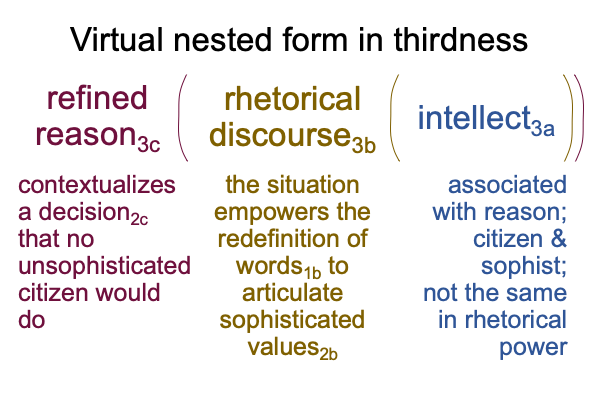0817 What about the abuse of power?
Here is a picture of the virtual nested form in the realm of normal contexts.

0818 As already noted, there are two nested forms contesting the content (or citizen) level. One goes with the unsophisticated citizen. The other associates with the “educated” sophist.
The normal context of rhetorical discourse3b does not respect the integrity of traditional spoken-word associations. Tradition builds language. Sophism3b manipulates what it did not create. Indeed, if the chances of victory1a were not enhanced by the clever use of spoken words, then the situation-level would not flourish and the perspective-level would not attain the fusion of money and persuasion that builds unimaginable fortunes.
0819 How so?
Why else would the one who pays3c, hiding behind the veil of refined reason3c, be willing to suffer the price commanded by the sophist who can get the job done2b?
For example, a trader who has cleared the roads to Thebes pays a sophist to advocate for a war between Athens and Syracuse, which will stop transport between Syracuse and Athens, but not stop transport between Syracuse and Thebes. If a declaration of war2c between Athens and Syracuse is passed, even if it only means a cessation of direct trading, then the Thebes-connected trader can now be the sole importer into Athens from Syracuse through Thebes, with the additional benefit of higher prices due to rarity… er… supply-chain challenges.
After all, there is no substitute for the raisins of Syracuse.
0820 The sophist3b will offer convincing reasons for why Athens should declare war2b, which is different from actually conducting a war, because this declaration will merely decree that no ships that have ported in Syracuse may dock in Athens for certain period of time. Yes, this is a “limited war”, an “economic war”, a “war sanctioning Syracuse” for its offensive behaviors, including undercutting raisin production around Athens by offering dried grapes of higher quality at lower price.
What reasonable citizen would not vote for such a “war”?
0821 What happens after the “war” is enacted?
The citizen’s wife later complains that the price of those delicious and affordable raisins from Syracuse has skyrocketed, and the slaves who are supposed to pick the dried grapes around Athens have been tasked with other labors.
Will the reasonable citizen now vote for a decree demanding that the Athenian slaves who once picked raisins must now return to their old jobs?
No, that would be crazy.
0823 Perhaps, the reasonable citizen will realize, too late, that he voted for a decision2c that makes no sense.
0824 So, he goes to the sophist to complain and finds that the sophist has changed. His consort is not longer this plain-looking woman from a wealthy family. His consort is incredibly beautiful and obviously trained in the arts of…
Well never mind that!
0825 Meanwhile, the trader, whose clandestine meeting with his sophist has been interrupted by this “reasonable citizen”, stands behind a curtain and overhears the conversation. The trader silently feels the power inherent in what he has done. He has brought Athens to its knees. Over dried grapes, no less. Such a little thing presages greater things. Soon, Athens will be on its knees to this trader, who will then demand the war that he desires. Yes, the trader angles for a real war, not with Syracuse, but with unsuspecting Thebes, whose trading business is ripe for takeover.
